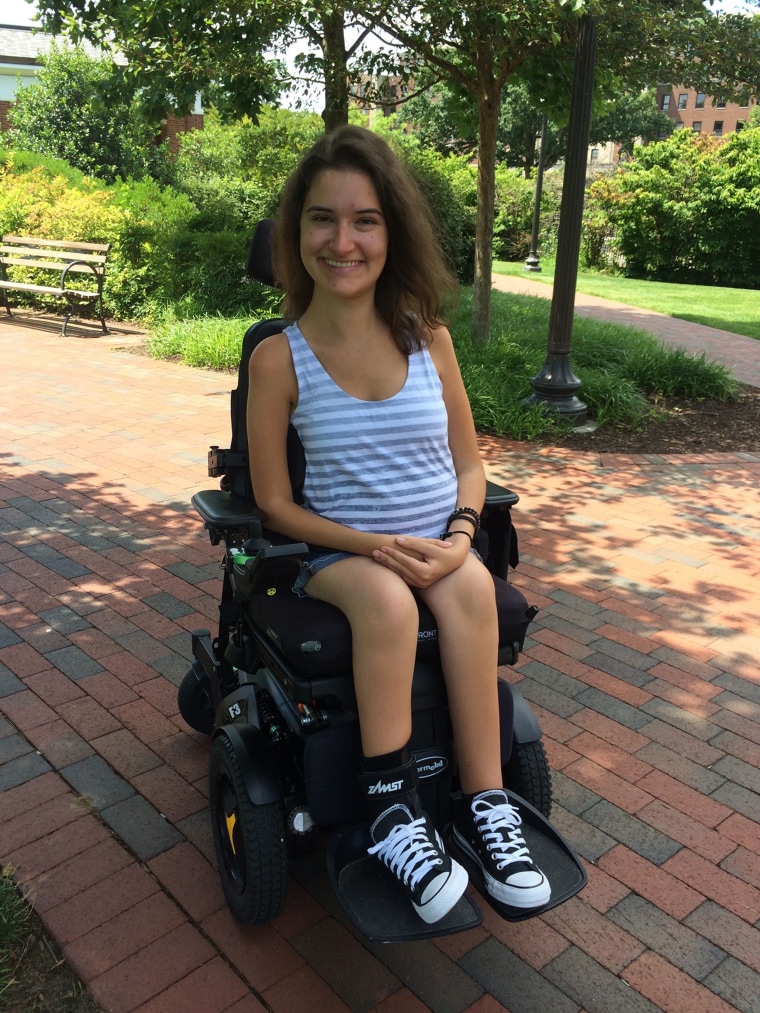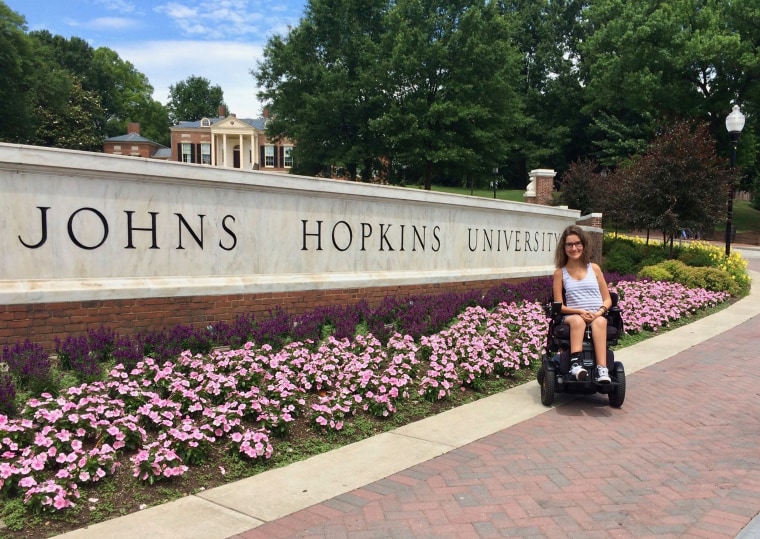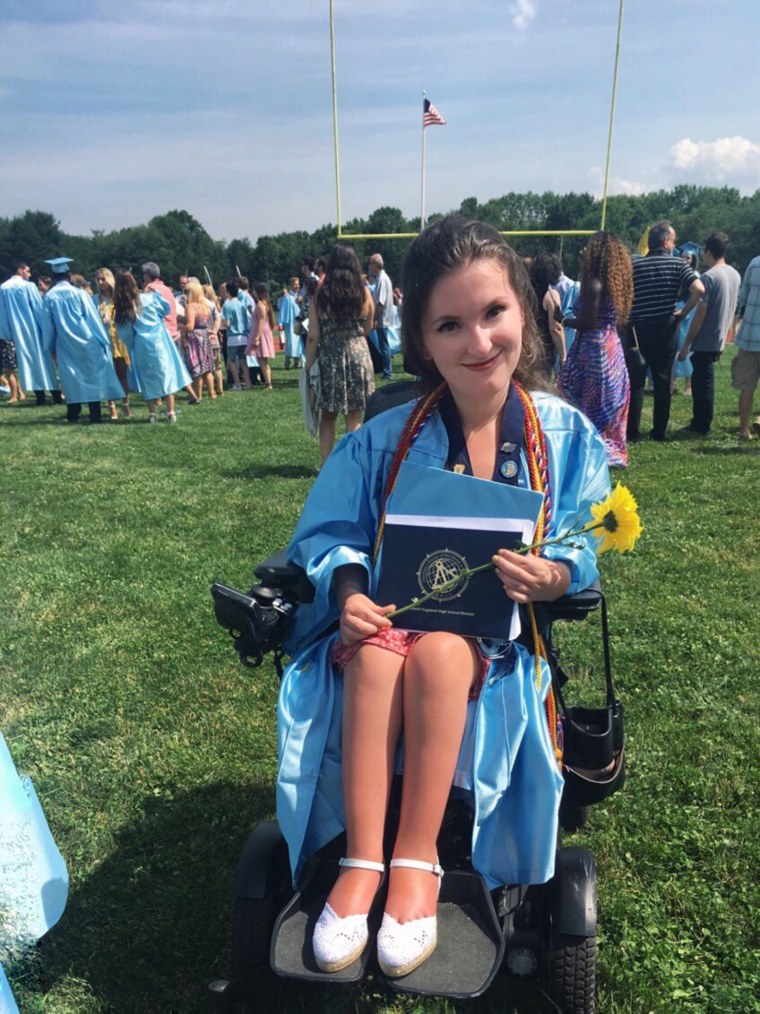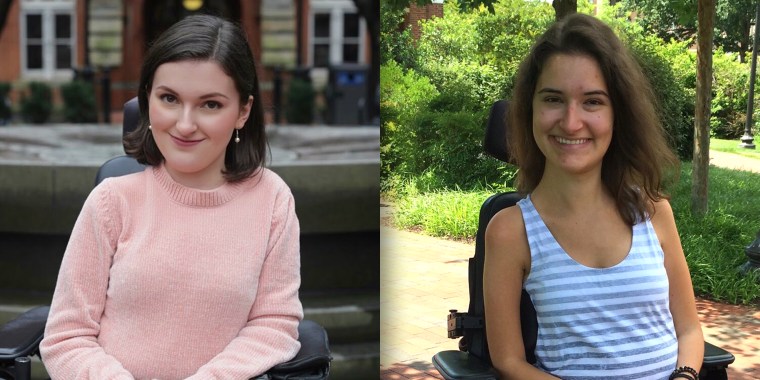College can present a lot of difficulties for students. Final exams can be challenging, internships are hard to get and campus life can seem overwhelming. But for students like Anna Landre, 20, and Darcy Trinco, 17, there are even more obstacles stacked against them.
Both young women use motorized wheelchairs, and require care provided by an aide to exist in their daily lives. Yet both are ambitious women who wanted to go away to college — as opposed to living at home and attending community colleges like so many suggested they do.
Darcy's mom, Michelle Trinco, said people are surprised when her daughter says that she is attending Johns Hopkins University in the fall.
"She's got no issues with learning, but people just lump everybody into one basket. You're disabled and therefore you should just stay home, and if you need to go to college you should just go to your local community college," Trinco said.

Challenging expectations
Both women have faced challenges in attending their dream colleges.
Landre, a sophomore at Georgetown University in Washington, D.C., has type-2 spinal muscular atrophy, a genetic disease that affects the part of the nervous system that controls voluntary muscle movement.
In order to attend Georgetown, Landre, who is from Lacey, New Jersey, hired on-campus students to serve as nursing aids, as funded by her Medicaid coverage — but a recent dispute with her insurance provider almost caused her to drop out.
Trinco just graduated from high school in Mendham, New Jersey and has been accepted at Johns Hopkins University in Baltimore, Maryland for the fall. She's hoping to pursue a pre-med curriculum, but she and her mother have had a hard time extending her Medicaid care hours to guarantee the care she'll need if she moves away from home. Trinco, like Landre, has type-2 spinal muscular atrophy.

"It's long and convoluted, and it takes a great deal of patience and preparation and keeping track of your paperwork," said Trinco's mom, Michelle. "Nobody ever seems to know what goes beyond the next step, so we just take it one step at a time."
Trinco said that her current allowance of 30 hours of home care a week would not be enough to live independently at college. At home, she is dependent on assistance for things like preparing meals, going to the bathroom and operating her breathing machine at night — tasks that will not go away when attending school.
"The question for us has always been, how do we get this care transferred to college? And that's not very clear from the people that we spoke to," her mom explained.
While the aide would not need to supervise Trinco constantly, they would need to be available on an almost "on-call" status, able to help as necessary.
The pair is spending the summer doing everything they can to make sure Trinco's care will be applicable when she attends college.
Struggling to maintain adequate care
Landre is one of those students who does have the "ideal" coverage of 16 hours of care a day. Like Trinco, she and her family had trouble confirming that she'd be able to transfer her home coverage to college.
During her first year on campus, everything worked out. She hired on-campus nursing students as her aides, having them help her with tasks like getting in and out of bed, cooking meals and getting dressed. Landre said that she made great friends on campus, calling it "her favorite place in the world." She has had a far greater amount of independence there than she had at home.
In May of her freshman year, though, a letter from New Jersey's Department of Human Services dashed her campus dreams — her care hours were being cut from 16 to 10 hours a day, a reduction that would force her to move back home. With the help of a pro-bono lawyer from a local non-profit, Landre and her family were able to appeal the decision. The judge ruled in her favor, meaning her care hours would remain the same.
Reassured, Landre returned to classes at Georgetown for her sophomore year.
"I thought we had dodged the bullet and fixed everything," she said, but the case went to New Jersey's Department of Human Services for review. There, the Division of Medical Assistant and Health Services reversed the ruling, officially dropping the care hours from 16 to 10 hours a day.
"I had success at every stage, I had the judge side with me, which to me seems like a good outcome, and then it was kind of arbitrarily, as it seems, reversed," Landre said. "You can do everything right and in the end, still end up losing your care."

However, a final, positive development emerged: On Friday, June 14, the state’s Department of Human Services backed off the cuts, restoring her care hours to the original 16 hours a day in a settlement agreement.
Changing society's perceptions of people with disabilities
While her case is resolved successfully (for now), Landre said she still isn’t done speaking out about the issue. She’s working with several state legislators, including New Jersey state Senator Vin Gopal and New Jersey Congressman Andy Kim, to bring about new legislation that would help rework and clarify how the care hours are calculated, create a task force and hold companies accountable when they pursue cuts.
"Insurance companies will always try and cut services like this, consistently," she said.
For Landre and Trinco, this inability to do something as common as attend college without a struggle is a symbol of the wider issues within the care system.
"There's one part, in the judge's decision about me, where she says 'These programs are primarily made for people who are 'homebound,' and Anna's being punished because she's pushing the boundaries of that,'" said Landre. "And that's so true!"
“It’s a big relief that I’m no longer in a state of crisis, but this only helps me,” Landre said in an interview with the Asbury Park Press on Monday. “There is so much more to be done. There are plenty of people who have to keep dealing with this until we fix it.”
